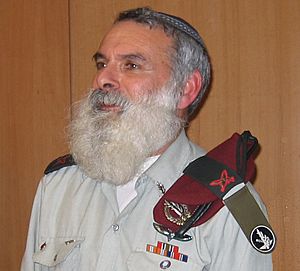Avichai Rontzki facts for kids
Quick facts for kids
Avichai Rontzki
|
|
|---|---|
 |
|
| Born | October 10, 1951 Haifa, Israel |
| Died | April 1, 2018 (aged 66) |
| Allegiance | Israel |
| Service/ |
Israel Defense Forces |
| Years of service | 1969–2010 |
| Rank | Brigadier General |
| Unit | Military Rabbinate |
| Commands held | Commander of the Military Rabbinate |
| Other work | Rosh Yeshiva of Itamar |
Avichai Rontzki (Hebrew: אביחי רונצקי, October 10, 1951 – April 1, 2018) was an important Israeli leader. He served as the Chief Military Rabbi for the Israel Defense Forces (IDF). This means he was the main religious leader for the Israeli army.
He held this important job from 2006 to 2010. During this time, he had the rank of Brigadier General. Before him, Rabbi Israel Weiss was in this role. Rontzki was also a rosh yeshiva, which is like a head teacher, at a special religious school called a Hesder Yeshiva in Itamar.
Contents
Who Was Avichai Rontzki?
Avichai Rontzki was born on October 10, 1951, in Haifa, Israel. He grew up in a family that was not very religious. He went to the Hebrew Reali School in Haifa.
His Journey to Faith
While serving in the army, Avichai Rontzki became more religious. This was a big change in his life. He and his wife, Ronit, decided to follow Jewish traditions more closely.
Starting His Army Career
In 1969, Rontzki began his military service. He first joined a special unit called Shayetet 13. However, he later moved to the 35th Paratroopers Brigade. He trained to be a squad leader and an officer.
He then served as a platoon leader and an executive officer. Later, he joined Sayeret Shaked, another special unit. He was a company commander during the Yom Kippur War.
Becoming a Religious Leader
After his army service, Rontzki studied at religious schools. These included Machon Meir and Mercaz HaRav. He also helped guide young people in Jerusalem.
In 1980, he started a Hesder Yeshiva in Elon Moreh. A Hesder Yeshiva is a unique program. It combines religious study with military service. In 1984, he helped create the community of Itamar. He also founded another Hesder Yeshiva there.
His Role as Chief Military Rabbi
Avichai Rontzki continued to serve in the army reserves. He rose to a high rank as a chief of staff. This was for the Samaria Territorial Brigade.
Taking on a Big Job
When he was offered the job of Chief Military Rabbi, some people advised him not to take it. This was because of a big military plan happening at the time. Despite this, he accepted the role in 2006.
Changes He Made
As Chief Military Rabbi, Rontzki brought many changes. The Rabbinate traditionally made sure army kitchens were kosher. They also provided religious services for soldiers.
Rontzki wanted the Rabbinate to be more active in the army. He worked to increase the number of rabbis in army battalions. This meant more religious support for soldiers.
Later Life and Legacy
In December 2014, Rontzki thought about running for a political party. He considered joining the Bayit Yehudi party.
Sadly, Avichai Rontzki passed away on April 1, 2018. He had been battling colorectal cancer. He left behind his wife, six children, and many grandchildren. He is remembered for his dedication to both his faith and his country.
See Also
 | Misty Copeland |
 | Raven Wilkinson |
 | Debra Austin |
 | Aesha Ash |

